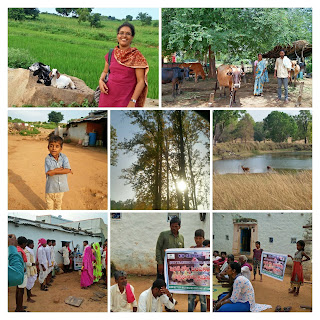Dr Laxmi Vadapalli, Senior Fellow, SaciWATERs
When I was about to make my choice for my Masters’ degree, the
predominant debate was about the career choices people make: should it be in
the natural sciences or the social sciences, if it is in the social sciences –
which discipline to choose and the preference of the university/institution
where one wishes to go. I made choice: I selected the University of Hyderabad
and decided to pursue a masters program in Sociology. After joining the
Masters’ program in Sociology at the University of Hyderabad which was
well-known for Natural and physical sciences, the frequently asked question
that I faced was: why do social sciences which did not seem to matter in the
scheme of things. At that time in the 1990s the character of the larger
educational ecosystem was that the students did under-graduate engineering
degrees first and then thought about their career choice: either become a
software engineer or an MBA graduate then join various IT-enabled industries or
software companies. Their ultimate dream destination was USA and thought that
they could live happily ever after. The Government of India policies also
promoted privately managed engineering colleges at the cost of social science
education and research. As the subject of education is in the concurrent list the
state/regional governments had a role in shaping the higher education in the
states/regions.
During my fieldwork for M.Phil and PhD degrees in the molecular science laboratories in the public-funded research institutions (CSIR and university laboratories), many of the scientists as well as the research students were curious as to what a social scientist was doing in their midst as a conventional lot of sociologists was supposed to look at caste, class and gender among other things. After completing my Ph D, my first job was with a Dutch funded program on biotechnology which had a requirement to ‘accommodate’ a Social Scientist. During this era, the social scientists working in the area of biotechnology were equated to be Vandana Shiva and Suman Sahai aka who are vocal, articulate and against science. Essentially this came from the mindset of looking at science as an esoteric activity outside the public scrutiny. This binary of ‘belonging neither here nor there was applicable to my parent department (Sociology) where research scholars were equally curious about what we were doing in the science laboratories.
One of the facts that dawned on me very early on in my career was this: whatever you study, it is in no way related to what you are going to do in your job. The skillset that I have acquired is more important and I have to build upon that. Having realized that, I have worked in several thematic areas such as agriculture, livestock, climate change, resettlement and rehabilitation in the irrigation, and mining sectors with rural communities and their livelihoods as the denominator.
While this was the attitude towards social scientists doing science research, the kind of funding that was flowing into social science research varied from national funding agencies such as the University Grants Commission (UGC), Indian Council for Social Science Research (ICSSR). The quantum of funds received from these agencies was far less when compared to those from the international funding agencies. In this context, the quality of the research output also suffered because of this trend. Further, this is also indicative of the perceptions of various funding agencies on the social science research in this country as pertinent issues such as climate change and its impact on different categories of farmers has largely remained outside the purview of research funded by these agencies. Another component of the research/implementation was the grants coming from Corporate Social Responsibility (CSR) by large corporate companies which were mandatory under the revisions brought to the Companies Act, 1956. The CSR activities were taken up as a matter of fact to meet the obligations and hence the focus is on implementing the activities of their choice in the field without little or any focus on field-based research. In this domain, the Non-Government Organizations (NGOs) and Community Based Organizations (CBOs) had an important role in implementing the activities in the field.
It also has to be highlighted that the larger political and economic context also has a bearing on the way social science research is perceived, conducted and funded in the Indian and the global context. While natural science research has been receiving increased funding particularly in the context of the global Corona pandemic, wonder what pandemic of sorts is required to promote social science research on an equal (if not more) scale?


Comments
Post a Comment